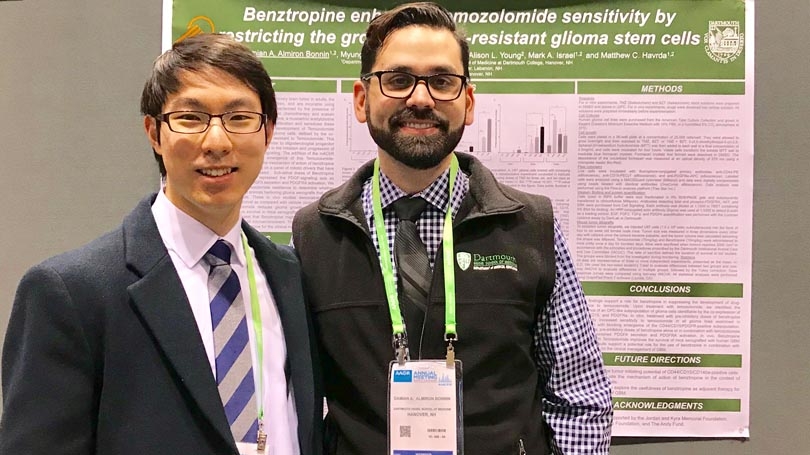
Damian Almiron Bonnin (R) received the Scholar-in-Training Award at the annual meeting of the American Association for Cancer Research. Pictured here with his poster and undergraduate student mentee, Noah Lee (L). (Photo: Almiron Bonnin)
The annual meeting for the American Association of Cancer Research took place in Chicago, IL April 14-18, 2018, drawing more than 20,000 scientists and industry professionals. Several Dartmouth PhD candidates, professors, and alumni went to represent the multitude of cancer research taking place on campus and hear about cutting edge advances from across the world.
Owen Wilkins and Nicholas Warren, current PhD candidates, and Damian Almiron Bonnin, GR’18, presented posters on their thesis research. Almiron Bonnin won an AACR Scholar-in-Training Award, which was generously sponsored by the American Brain Tumor association. This is a highly competitive award that recognizes outstanding early career investigators for meritorious work in cancer research.
Wilkins’ poster titled “Normal Breast Tissue 5- hydroxymethylcytosine is Enriched at DNA Regulatory Elements in Breast Cancer Cells” discussed the distribution of a new epigenetic marker across the genome of healthy and cancerous breast cancer cells. He found that regulatory areas of active genes are have a greater proportion of 5-hydroxymethylcytosine, and that dysregulation of this marker may contribute to the development of breast cancer. This work will help us understand why certain people get cancer. Wilkins’ poster was also one of four winners of the 2018 GRAD Student appreciation week poster session.
Warren’s poster titled “Targeting the checkpoint kinase CHK1 induces multiple pathways of cytotoxicity” focused on the development of novel combinations of chemotherapies. Many traditional chemotherapies work by damaging the DNA, which targets fast growing cells like cancer but also has side effects by damaging blood cells. Warren is interested in increasing the efficacy of these therapies by preventing repair of damage DNA by combining these therapies with a drug that inhibits the enzyme CHK1. He found that inhibiting CHK1 can increase DNA damage by different methods, depending on the specific combination. This will help pharmaceutical companies and clinicians develop new combinations of chemotherapy.
Almiron-Bonnin presented two posters titled: “HEY1-mediated inhibition of glioma stem cell proliferation is associated with restoration of glioma stem cell division asymmetry and transcriptional repression of PDGFRA” and “Benztropine enhances temozolomide sensitivity by restricting the growth of drug-resistant glioma stem cells.”
Almiron Bonnin’s work found that the transcription factor HEY1 prevents the expression of a growth factor receptor, PDGFRA, which is vital for cancer stem cells within brain tumors. This work does not only furthers our understanding of brain cancer biology, but also it could help us identify druggable targets to treat this incurable disease. He also demonstrated that benztropine, a drug currently used to treat Parkinson’s disease, slows the growth of brain cancer stem cells and sensitizes brain tumors to the standard-of-care chemotherapy, temozolomide. This combination shows great promise to help treat one of the most aggressive forms of cancer.
There were also hundreds of scientific seminars at the meeting. The opening Plenary Session brought several groundbreaking scientists to discuss advances in immunotherapy, a new class of cancer treatments that work by activating patients’ immune systems to fight off the cancer. One of the biggest challenges facing the immunotherapy field is identifying which patients will respond to the very expensive drugs, which can cost more than $100,000 per year. Only 20-50% of patients receive benefit from currently available immunotherapies, but those who do are often cured of their disease. Novel combinations of immunotherapy with cancer-killing viruses are promising avenues to increase the number of patients who see benefit.
The AACR is also involved in advocating for cancer research and other cancer-related health policies with the federal government. AACR was one of many organizations advocating for increases to federal funding of science. Just this March, Congress passed a 2018 budget that increased funding to the National institute of Health by 8%. AACR organizes annual hill days for early-career members, including graduate students, to advocate for science funding. AACR also works with federal agencies, like the Food and Drug Administration, to provide input from the cancer research community on issues like tobacco policy. A representative from the FDA hosted a discussion on new rules they are proposing to limit the amount of nicotine in combustible cigarettes. The FDA made an appeal to everybody in the audience to also provide public comment on their proposed rules so that they can get a comprehensive picture of the scientific community’s opinion.